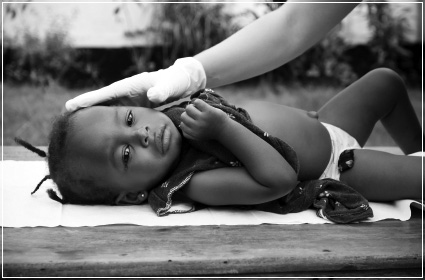projects » healthcare
“Vertical” health funds targeting specific diseases such as AIDS, malaria or TB have achieved some success, but only at the cost of draining resources from basic “horizontal” health infrastructure such as clinics. (European Parliament Report, 2010)
There is currently a Healthcare clinic situated on the edge of Ndanga Village. The building was erected in 2006 and has an additional shelter to offer shade which was built in 2009.The Clinic operates 4 days a week and is free to all women and children. All other adults must pay 75mk for any advice required, and young people aged 16-20 must pay 25mk.
 There is a Medical service available once a week at which time some basic first aid and general medical advice can be given. Other services currently available are Antenatal clinics and Health Surveillance Clinics for under fives.
There is a Medical service available once a week at which time some basic first aid and general medical advice can be given. Other services currently available are Antenatal clinics and Health Surveillance Clinics for under fives.
However there is never enough capacity to meet demand. For example the Health Attendant will travel to the nearest town to collect vaccines for the under fives, but can only carry a small quantity in his cool box, which means that for many they must visit several times before they get the treatment they need.
The women were quick to highlight what they would like to be able to access in terms of healthcare which includes access to basic first aid, dental care and most importantly improved access to maternity services as many lives – both mother and child – are lost due to difficult labour.
In the rural areas there are still high numbers of infant mortality, through childbirth or diseases relating to children not having access to vaccination programmes and of course malnutrition.
In order to address some of these challenges Village Foundations have identified areas which need further research in order to meet the needs of the women and children in the rural areas.
These include:
- Transferring the existing clinic into a new purpose built facility on the Mudzi Foundations Project Site.
- Developing the existing clinic building to create a Mother and Baby Unit with Traditional Birth Attendants to allow safe delivery of babies in both the facility and in the home.
- Access to basic first Aid sessions and education on simple treatments which can be self administered.
- Further development of the Health Surveillance for under fives, access to Vaccination Programmes, HIV Testing, Malaria Testing – and initial treatment programmes.
- Infant feeding Programmes, using locally sourced Plumpynut to reverse the effects of malnutrition.
The key objectives of the Healthcare Project are to:
- To create a sustainable Healthcare model that will ensure timely observation, diagnosis and treatment where possible and referral to specialist centres as required.
- To allow robust Health surveillance in under fives and appropriate intervention to ensure survival into older childhood.
- To Provide Family Planning advice and education.
- To provide safe environments for the delivery of babies and care of pregnant women.
We will be measuring the success of this arm of the Project on the following outcomes:
- Decreased Infant mortality.
- Increased Recovery/Survival rates from malnutrition.
- Increased early diagnosis/Survival rates from Malaria.